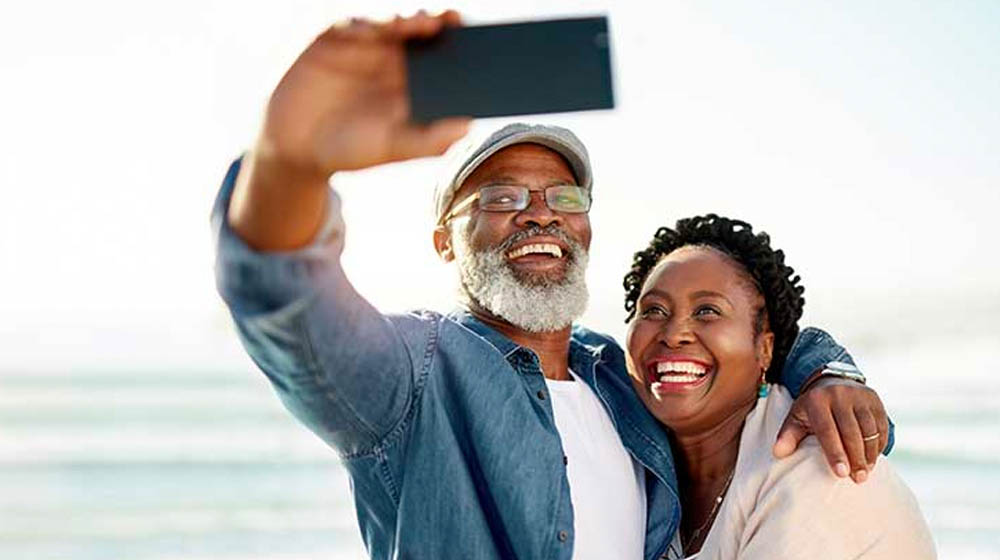Smartphones get smarter every year, and all of the options can be confusing and often unnecessary. If you’re a senior or shopping for an older loved one, you might be overwhelmed with the options. A simple, traditional cell phone might seem like the best bet, but smartphones have several advantages that might make them a better option. If you’re in the market for a smartphone, there are certain features you might want to look for that may make it easier to use for seniors in particular.
Smartphone Accessibility Features for Seniors
-
Large screen: Smartphone screens are typically between 4 and 6.5 inches, though larger ones are introduced every year (often called “phablets” because they are between the size of a phone and a tablet). Larger screens are easier to see and allow for larger icons, which are easier to manipulate on a touch screen.
A large screen also means a larger phone, which is harder to misplace. When choosing the right size phone, think about how you’ll carry it: Do you need it to fit in your pocket? A 6.5-inch phone can fit in most standard pants pockets. Or do you have a larger purse you’ll carry it in? You might opt for a larger phablet-style phone.
-
Simple display: Look for a phone with a simple display screen and large icons. Some phones are designed for seniors or people who want a simple phone experience, and these come with a simple display as their default setting. But some more complex phones can be adjusted to feature a simple display. Try out a few and see which display is most intuitive and appealing for you.
-
Easy to hold: Consider the shape and size of the phone, especially if you have arthritis or dexterity issues. It may be difficult or tiring to hold a heavy or very wide phone for a long period of time. It may also be difficult to open and close a flip phone. A sturdy, midsize phone might be a good compromise if you have limited mobility or arthritis in your hands.
-
Volume range: If you have a hard time hearing, you’ll want a phone with a broad range of volume to accommodate your needs. Look for a phone that allows you to easily adjust the volume using a button on the side of the phone, instead of requiring you to go into the phone’s settings.
-
Bluetooth capability: Thanks to technological advances, many medical devices can now be controlled via your smartphone through Bluetooth capabilities. Depending on the medical device model, keeping the Bluetooth connection on your phone turned on can allow you to adjust your Hearing aids, medical alert system and even your adjustable bed straight from your smartphone.
Health Features on Smartphones for Seniors
-
Health trackers: A smartphone can be a handy way to manage your healthcare. It can provide scheduled alarms and reminders to take your medications, fill prescriptions, or attend appointments. You can also use your phone to track your diet and exercise. Look for a phone that has simple, self-explanatory ways to track exercise, diet, medications, and appointments. Many Apple phones, for example, have a built-in Health app that can do all of these things for you. If you choose a smartphone that allows you to download applications, you can select customized apps related to your particular concerns, with pill reminders, glucose trackers, and more.
-
Hearing aid compatibility: Hearing aids emit a high-pitched sound if they are held up to cell phones that are not equipped with hearing-aid compatible technology. The FCC requires phone manufacturers to rate their phones for hearing aid compatibility, so look for highly-compatible models. Since a particular smartphone may perform differently depending on your hearing aid model, it’s best to test a particular phone for compatibility with your specific hearing aids before you purchase it.
Senior Smartphone Emergency Features
-
Link to emergency response: All new cellular phones in the United States are required to allow emergency phone calls to 911 even if there is no SIM card and the phone is not unlocked. However, you can also purchase additional protection through on-call services such as GreatCall and 5Star Urgent Response.
-
GPS location: Many phones allow you to select a person to receive your GPS coordinates in case of an emergency. If you are unresponsive or get lost, your loved ones will be able to find you. This may require setting up an app or selecting a particular setting on both your phone and your loved one’s phone.
Other Smartphone Features for Seniors
-
Long-lasting battery: Some cell phone batteries have to be recharged every few hours throughout the day. That can be annoying and even dangerous if your phone dies when you need it. Look for a phone with a long-lasting battery, so you can charge it overnight and not worry about it during the day. You might also consider purchasing a portable battery charger, especially if you’ll be traveling; these devices plug into an electric outlet and build up an electric charge, then you carry the portable charger with you to charge your phone when needed.
-
Camera: Make sure your phone has a great camera that can capture important moments in your life. You can also use the camera to video chat with friends and loved ones. Most phones come with a camera of some kind, but higher-end phones often have high-quality cameras ideal for documenting all of your special moments.
-
Games: Some phones have fun games that you might enjoy, like word searches and puzzles, built into the phone. Many phones let you download additional applications featuring your favorite games like Scrabble or Solitaire. Games are fun and can also be a great way to strengthen your memory and problem-solving skills as you age.
Bottom Line
The right smartphone depends on your particular needs and your level of comfort with technology, as well as your budget both for purchasing the device and paying for the monthly plan. Not all phones will have all of the features listed in this guide, so be sure to find one that checks all the boxes for your needs.


